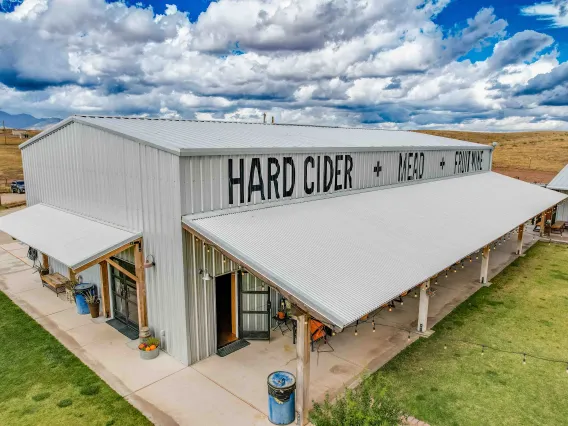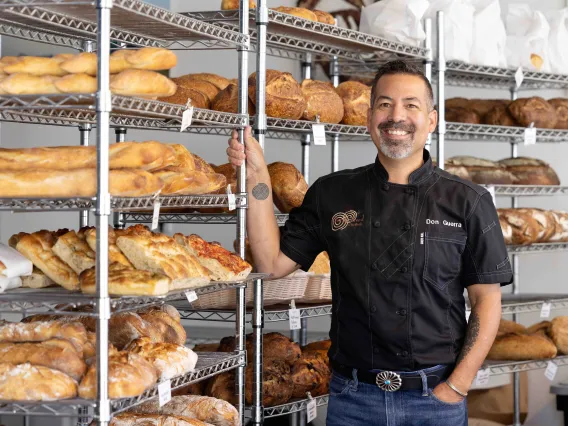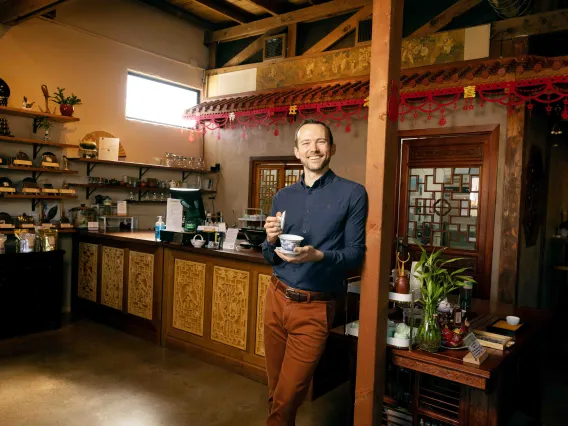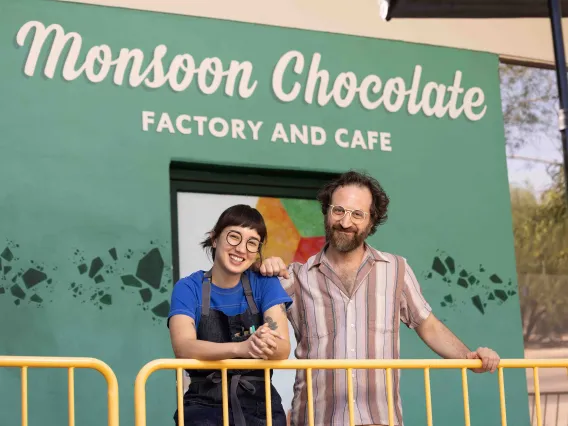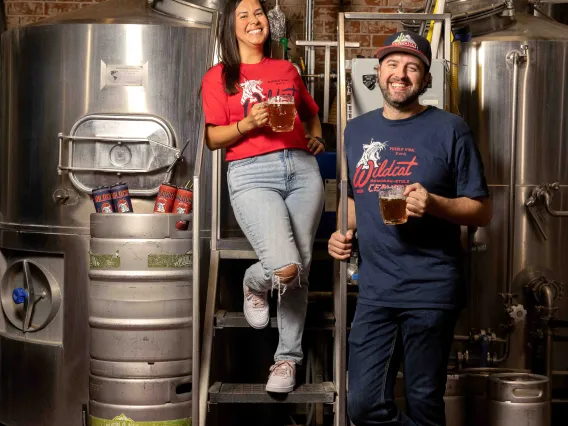The Yellow Brick Road
Sibling trust sustains a local coffeeshop.
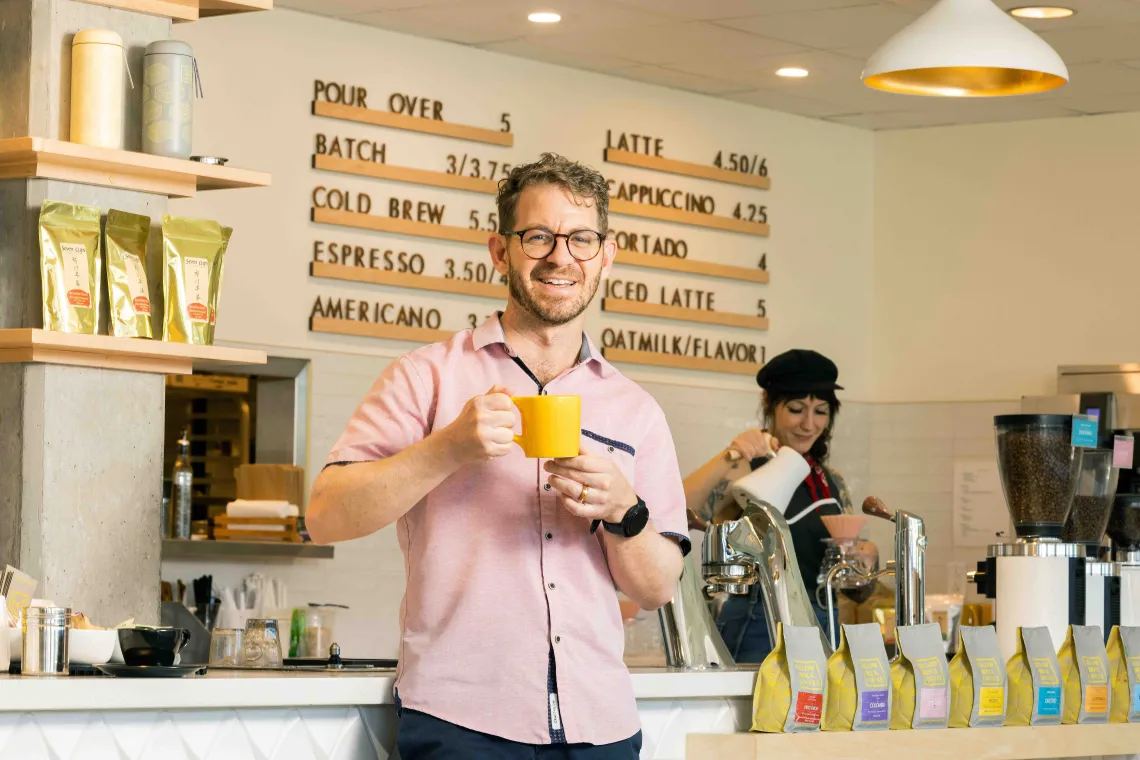
David Perreira ’06, co-owner of Yellow Brick Coffee, and staff member Lea Burkholder
Chris Richards
When they were small, Anna ’04 and David Perreira ’06 weren’t just sister and brother. They were best friends, trusting one another more than they trusted anyone else in upstate New York, where they were born, or Tucson, where they moved when David was 8 and Anna was 12. More than anyone in the world, really, says Anna — so perhaps it’s no surprise that after life pushed them apart, it brought them together again.
It was coffee that reunited the siblings, though it took some time.
About 15 years ago, Anna found herself in New York City, where she worked as a financial analyst after earning a University of Arizona bachelor’s degree in math. Back then, she drank coffee like so many 9-to-5ers do: for the caffeine and sugar rush. To get through the day.
After completing his own UArizona degree, in Spanish linguistics, David also had left the Southwest, moving overseas. A backpacking enthusiast, he dreamed of someday opening a hostel in Nicaragua. He didn’t have a passion for coffee yet, either.
But one day in the Big Apple, a friend invited Anna to a guided coffee-tasting. She learned to discern the subtleties of flavors and met Peter Giuliano — a big name in the Third Wave coffee movement, which calls for coffee that is “traceable back to the farm and roasted to highlight its flavor,” says David.
She was hooked — and not on caffeine.
“It blew my mind that I could taste notes of orange or blueberries,” Anna says. “I started to read about coffee sourcing. I would talk about it all the time and even spent my lunch hour at a local coffee training facility each week.”
Goodbye to finance. Goodbye to New York.
Hello — click of the heels — to home.
Anna founded the specialty roastery Yellow Brick Coffee in 2011. She had almost everything she needed: Knowledge, gleaned through courses on coffee history and roasting techniques. A space to start up in her parents’ Green Valley garage. Motivation to share not only superb, single-origin coffee but also the story behind it. A 5-pound roasting machine.
But she didn’t have a copilot. She turned to her brother, by then a hospitality grad student in Flagstaff.
“His work ethic was obvious, and we shared the same values of supporting diversity and community,” she says. “Considering a partnership with him was a no-brainer.”
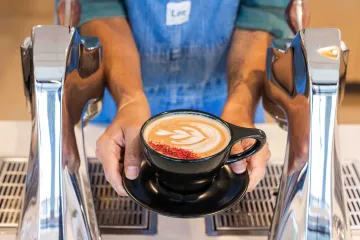
Chris Richards
She began mailing him coffee samples, and he formed his own interest in the drink. Soon, David was on board.
“Our skill sets are very complementary,” Anna says. Plus, “He was willing to help in exchange for a free spare bedroom in my crappy little apartment.”
The siblings traveled through Central America, forging relationships with coffee farmers in Guatemala, El Salvador and Honduras. In 2013, Yellow Brick Coffee opened as a roastery-cafe on Tucson’s South Dodge Boulevard.
Like Anna, David is aware of how special it is to work alongside family.
“It’s difficult, but there’s no one you trust more, who you know is going to put in the extra time,” he says. “If something goes wrong at 2 in the morning, we will troubleshoot together. You’re not alone.”
The roastery remains on South Dodge. But last March, the Perreiras moved their cafe to Country Club Road.
One day last fall, David sat outside the cafe, speaking about his and Anna’s journeys as the owners of a small business. About what it means to be local. To not be Starbucks.
A man from Tirrito Farms in Willcox walked by, and David gestured toward him.
“We choose to carry their milk,” he said. “We don’t have to. We can get milk from Shamrock. It would be easier and maybe a little cheaper. But Tirrito's milk is phenomenal.”
It’s a feeling echoed by Anna: Place matters. Community does. Identity, too.
“Starting Yellow Brick Coffee was a passion project,” she says. “I wanted to share what I was learning with the world. What I really wanted to share was an entire experience — not just the flavors but also the depth of culture tied to individual coffee growing regions.”
The siblings no longer source all their coffee directly. Each is married, and travel costs more cups of coffee than one can count. Anna works full time elsewhere.
But they still believe in traceability — in telling the story behind a cup through tasting notes and details like elevation, processing method, and farm or cooperative of origin; in recognizing the farmers whose work permits us to drink coffee in the first place.
Coffee like Kenya: Ichamama, a highlight on the shelves grown by small-lot farmers at the Ichamama Washing Station, part of the Othaya Cooperative in Nyeri, Kenya.
“This coffee is very clean and has the perfect body, with a juicy acidity and the notes of black currant that we love to highlight in quality Kenyas,” David says. “In 2017, we had the opportunity to visit the cooperative and saw firsthand their focus on quality and consistency, which helps their coffee shine in the cup year over year.”
Shine, perhaps, like a road of yellow bricks. Like a sister and her brother, back home.

